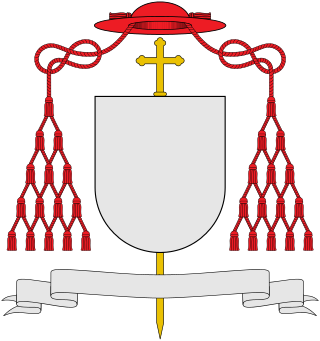Related Research Articles

The Anglican Communion is the third largest Christian communion after the Roman Catholic and Eastern Orthodox churches. Founded in 1867 in London, the communion has more than 85 million members within the Church of England and other autocephalous national and regional churches in full communion. The traditional origins of Anglican doctrine are summarised in the Thirty-nine Articles (1571). The archbishop of Canterbury in England acts as a focus of unity, recognised as primus inter pares, but does not exercise authority in Anglican provinces outside of the Church of England. Most, but not all, member churches of the communion are the historic national or regional Anglican churches.

The archbishop of Canterbury is the senior bishop and a principal leader of the Church of England, the ceremonial head of the worldwide Anglican Communion and the bishop of the Diocese of Canterbury. The current archbishop is Justin Welby, who was enthroned at Canterbury Cathedral on 21 March 2013. Welby is the 105th in a line which goes back more than 1400 years to Augustine of Canterbury, the "Apostle to the English", sent from Rome in the year 597. Welby succeeded Rowan Williams.

A bishop is an ordained clergy member who is entrusted with a position of authority and oversight in a religious institution.

The Church of England is the established Christian church in England and the mother church of the international Anglican Communion. It traces its history to the Christian church recorded as existing in the Roman province of Britain by the 3rd century and to the 6th-century Gregorian mission to Kent led by Augustine of Canterbury. Its adherents are called Anglicans.

A cardinal is a senior member of the clergy of the Catholic Church. Cardinals are created by the current pope and typically hold the title for life. Collectively, they constitute the College of Cardinals.
The First Council of Nicaea was a council of Christian bishops convened in the Bithynian city of Nicaea by the Roman Emperor Constantine I in AD 325.

The pope, also known as supreme pontiff, Roman pontiff or sovereign pontiff, is the bishop of Rome, head of the worldwide Catholic Church, and has also served as the head of state or sovereign of the Papal States and later the Vatican City State since the eighth century. From a Catholic viewpoint, the primacy of the bishop of Rome is largely derived from his role as the apostolic successor to Saint Peter, to whom primacy was conferred by Jesus, who gave Peter the Keys of Heaven and the powers of "binding and loosing", naming him as the "rock" upon which the Church would be built. The current pope is Francis, who was elected on 13 March 2013.

A cathedral is a church that contains the cathedra of a bishop, thus serving as the central church of a diocese, conference, or episcopate. Churches with the function of "cathedral" are usually specific to those Christian denominations with an episcopal hierarchy, such as the Catholic, Eastern Orthodox, Anglican, and some Lutheran churches. Church buildings embodying the functions of a cathedral first appeared in Italy, Gaul, Spain, and North Africa in the 4th century, but cathedrals did not become universal within the Western Catholic Church until the 12th century, by which time they had developed architectural forms, institutional structures, and legal identities distinct from parish churches, monastic churches, and episcopal residences. The cathedral is more important in the hierarchy than the church because it is from the cathedral that the bishop governs the area under his or her administrative authority.

The bishop is a piece in the game of chess. It moves and captures along diagonals without jumping over intervening pieces. Each player begins the game with two bishops. One starts between the king's knight and the king, the other between the queen's knight and the queen. The starting squares are c1 and f1 for White's bishops, and c8 and f8 for Black's bishops.

In Christian denominations, an archbishop is a bishop of higher rank or office. In most cases, such as the Catholic Church, there are many archbishops who either have jurisdiction over an ecclesiastical province in addition to their own archdiocese, or are otherwise granted a titular archbishopric. In others, such as the Lutheran Church of Sweden, the title is only borne by the leader of the denomination.

In church governance, a diocese or bishopric is the ecclesiastical district under the jurisdiction of a bishop.
Emeritus is an adjective used to designate a retired chair, professor, pastor, bishop, pope, director, president, prime minister, rabbi, emperor, or other person who has been "permitted to retain as an honorary title the rank of the last office held".
A suffragan bishop is a type of bishop in some Christian denominations.

The mitre or miter, is a type of headgear now known as the traditional, ceremonial headdress of bishops and certain abbots in traditional Christianity. Mitres are worn in the Catholic Church, Eastern Orthodox Church, Oriental Orthodox Churches, the Anglican Communion, some Lutheran churches, for important ceremonies, by the Metropolitan of the Malankara Mar Thoma Syrian Church, and also, in the Catholic Church, all cardinals, whether or not bishops, and some Eastern Orthodox archpriests.

The Catholic Church, also known as the Roman Catholic Church, is the largest Christian church, with 1.3 billion baptized Catholics worldwide as of 2019. It is among the world's oldest and largest international institutions, and has played a prominent role in the history and development of Western civilization. The church consists of 24 sui iuris churches, including the Latin Church and 23 Eastern Catholic Churches, which comprise almost 3,500 dioceses and eparchies located around the world. The pope, who is the bishop of Rome, is the chief pastor of the church. The bishopric of Rome, known as the Holy See, is the central governing authority of the church. The administrative body of the Holy See, the Roman Curia, has its principal offices in Vatican City, a small enclave of the Italian city of Rome, of which the pope is head of state.
A titular bishop in various churches is a bishop who is not in charge of a diocese. By definition, a bishop is an "overseer" of a community of the faithful, so when a priest is ordained a bishop, the tradition of the Catholic, Eastern Orthodox and Oriental Orthodox churches is that he be ordained for a specific place. There are more bishops than there are functioning dioceses. Therefore, a priest appointed not to head a diocese as its diocesan bishop but to be an auxiliary bishop, a papal diplomat, or an official of the Roman Curia is appointed to a titular see.

An auxiliary bishop is a bishop assigned to assist the diocesan bishop in meeting the pastoral and administrative needs of the diocese. Auxiliary bishops can also be titular bishops of sees that no longer exist as territorial jurisdictions.

The hierarchy of the Catholic Church consists of its bishops, priests, and deacons. In the ecclesiological sense of the term, "hierarchy" strictly means the "holy ordering" of the Church, the Body of Christ, so to respect the diversity of gifts and ministries necessary for genuine unity.

In the Catholic Church, a bishop is an ordained minister who holds the fullness of the sacrament of holy orders and is responsible for teaching doctrine, governing Catholics in his jurisdiction, sanctifying the world and representing the Church. Catholics trace the origins of the office of bishop to the apostles, who it is believed were endowed with a special charism and office by the Holy Spirit at Pentecost. Catholics believe this special charism and office has been transmitted through an unbroken succession of bishops by the laying on of hands in the sacrament of holy orders.

The Episcopal Church, based in the United States with additional dioceses elsewhere, is a member church of the worldwide Anglican Communion. It is a mainline Protestant denomination and is divided into nine provinces. The presiding bishop of the Episcopal Church is Michael Bruce Curry, the first African American bishop to serve in that position.
References
- Eusebius (1856). "Chapter XIV: The bishops that flourished at this time". Ecclesiastical History (10th ed.). New York: T.N. Stanford. p. 286. OCLC 1043248103. OL 14005648M.